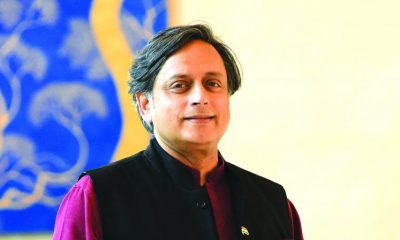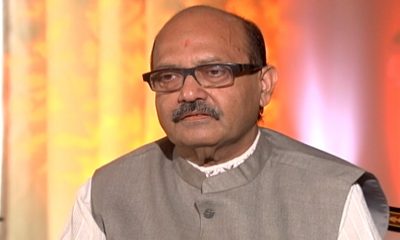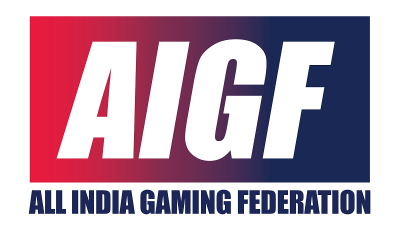Legal & Regulatory
Feature: Leading British gaming lawyer Carl Rohsler shares his insights on gaming in UK, India's gambling regulations and models for reforms

In this post we present an interview with British gaming lawyer and partner of International law firm Squire Sanders, Mr. Carl Rohsler. Mr. Rohsler is a leading authority on gambling laws in the United Kingdom and has written several books and articles on the subject. He is also interested in India’s gaming laws and the need for regulating gambling in India. He has been a keynote speaker at last years conference on legalising sports-betting in India organised by FICCI and has actively written on the need for regulating India’s gaming laws. In this interview, Mr. Rohsler answers questions on the gambling regulations in UK, model for reforming gaming laws, skill v. chance debate and a number of other issues.
Q. Mr. Rohsler, it is a pleasure to present your interview to our readers. Could you briefly tell us what got you interested in gaming law and why you chose this area of practice?
Carl Rohsler (CR): I started my life as an intellectual property (IP) lawyer working on trade marks, copyright, patents, IT, e-commerce and related issues. Indeed, I still spend a large amount of my time advising on IP. In about 1994 I was first asked to provide an opinion on whether it was possible for an American corporation to take bets from UK citizens over the Internet. I think the file was given to me because I was the most junior person in the team! But I soon began to realise that this was a fascinating question which brought up lots of interesting areas of law and also highlighted the conflicts of different legal systems which had very different approaches to gambling.
I began to get introduced to a number of the early online gambling companies. At the time, many of these were just start-ups struggling to come to terms with a legal and regulatory framework which was in almost all cases designed exclusively for land-based gambling. It was also clear that these companies were very heavily reliant on intellectual property: their chief assets were intangible (such as their brands, computer software and customer databases). So I was naturally drawn to working with them and trying to help them with their other legal problems as well.
Another important factor was that, in 2005, the UK passed the Gambling Act, legislation which provided a completely new framework for gambling. Sweet & Maxwell, one of the academic publishing houses for lawyers, asked me whether I could provide a commentary on the Act and, although it proved a lot of hard work, it also gave me a unique opportunity to read about and observe the development of the legislation and to spend some time just thinking about gambling. The success of that publication (Current Law Statutes Guide to the Gambling Act 2005) led to a further opportunity to write a more lengthy work on gambling (Licensing Law and Practice, Sweet & Maxwell, 2008) which helped me to develop my understanding of the area further.
Now I find it quite hard to think of myself back as a pure IP lawyer and I will always have an interest in the gambling world. There are several reasons.
First, it is an area which always attracts controversy – some argue for complete liberalisation whilst, at the other end of the spectrum, others have deep moral and religious objections to any gambling.
Second, gambling law it provides an opportunity (particularly in the field of online gambling) to look at the way that different legal systems address themselves to the problem of globalisation. The world has stopped being a series of easily defined nation states and is now in many ways a single global village where citizens can move from London to Lahore at the click of a mouse. How does national law address itself to managing that practical freedom?
Third, those I have met in the gambling industry usually have two very attractive characteristics: they are very quick witted and also very friendly gambling is a social business which attracts many clever entrepreneurs. I’m endlessly amazed by the ingenuity of those leading the development of the gambling industry and that means that the industry is a fascinating and challenging place to work.
Q. India has largely followed the British model of prohibiting gambling based on the (except betting on horse-racing) Victorian notion of morality and the archaic British-era Public Gambling Act, 1867 has been adopted by most states or legislation has been drawn on similar lines. However, UK itself has seen changes in its gaming laws in the past few decades and comprehensive changes after the passage of the Gambling Act of 2005 liberalising the sector. Can you take us through the changes in UK laws on gaming and betting and current position in UK post the passage of the Gambling Act of 2005?
CR: The Gambling Act became necessary because it became increasingly apparent that the previous regime (established in the 1960s and 70s) was outmoded and incapable of dealing with the challenges of modern gambling. First, the structure of the old law depended very much on primary legislation which meant that it was difficult to adapt and modify in line with changes in society. Second, the former legislation had been passed to the time when there was considerable concern about the involvement of crime in gambling and a general political attitude that disapproved of the industry and sought to ensure that regulated gambling merely catered for pre-existing demand rather than stimulating the growth of the industry. Such an attitude could not really continue in a country that had, since 1993, embraced a national lottery. Third, the system of regulation was based almost entirely upon the control of physical premises at which gambling took place the law had no ability to deal with the rise of online gambling which meant, effectively, that more and more UK citizens were gambling with offshore operators in a way that was effectively unregulated and untaxed by the British government. Finally, the regulation of gambling was confused: the Gaming Board dealt with casinos but local criminal courts dealt with applications for bookmaking permits and premises licences and local civil government was also involved in some forms of lottery regulation. In short, the law was an inefficient and confusing patchwork.
The new Act was designed to address all of these issues. It created a single regulator for the entire sector, changed the law to permit and regulate remote gambling within the United Kingdom and created a single framework for the regulation of all forms of gambling which also had a degree of flexibility to allow for future change. Although there are still challenges and debates, the UK is generally regarded as having made significant progress in modernising the industry and maintaining its position as one of the leading jurisdictions for gambling regulation.
Q.You have closely followed Indias gaming laws, advised companies on it and even presented a paper on it in the FICCI conference held in 2012. What is your opinion on Indias archaic and contradictory gaming laws and what are your suggestions for changes and reforms? Which model should the lawmakers follow in liberalising the sector?
CR: It is not really for me to comment about the attitude that Government should adopt in respect of gambling. Some jurisdictions use gambling as a source of revenue (look at Nevada, Macau, Gibraltar and so on) others impose a total ban on religious or political grounds (particularly some of the Arab states). Most countries accept that gambling is something that many people enjoy and that, provided that it is well regulated and controlled, it is a relatively harmless form of entertainment which can also be a source of taxation. All of these attitudes can be legitimately defended. What I think is more difficult to defend is not having a clear position at all. The problem with confusion and lack of regulation is that it forms an encouragement to precisely those types of operator who are undesirable in the industry.
At present, we believe that the betting industry in India is worth approximately US$60 billion. The vast majority of that gambling is illegitimate and hidden. There are no protections for the public. We do not know how much that gambling is with children or the vulnerable, we cannot see clearly whether it represents the proceeds of crime Those who gamble have no recourse to protections against dishonest bookmakers. Finally, and unfortunately, India has a growing reputation as a jurisdiction associated with match fixing scandals. Thus, by not regulating, India exhibits all of the worst aspects of the gambling industry and none of the good ones. And through all of this, the government is not even deriving any revenue from gambling. It is the worst of all possible positions.
What I advocate is positive and strong regulation which accepts that gambling is a part of society and seeks to control and understand it. When gambling is properly regulated, Government gives itself the tools of control to decide what policy it wishes to adopt. Where it does not, it simply encourages illegitimate operators and allows others to decide what type of gambling to which the Indian public will be exposed.
Q. You have stated in the FICCI paper that sports-betting could be considered a game of skill based on the Lakshmanan and Satyanarayan decisions (decisions declaring rummy and betting on horse-races to be games of skill). However, considering that betting falls within the basic definition of wagering and has always been considered so and also since there is a global precedence for declaring betting to be a gambling activity (based on chance) and regulating it accordingly, do you think this position is tenable? How will courts in India react to it?
CR: To be honest, I really dont care very much about classification per se. In England, Bingo is regulated differently to other forms of game – but it is still a game of chance. Poker is regulated as a game in the same way as roulette even though one is heavily based on skill and the other is totally based upon chance. Betting is something that can be based upon skill or chance, depending upon the event which is the subject of the gamble: betting on the roll of a dice is a matter which cant be the subject of skill and judgement, whilst betting on a sporting event at least carries with it the possibility for judgement to be used. There are also no really sensible barriers between some forms of insurance and forms of gambling and we are also seeing a debate about whether forms of social gaming should be regulated as a form of gambling. The distinctions that we make are artificial because games, pastimes, contests and financial investment are all human artifices in the first place
For me, the better approach is to ask a number of questions about any particular activity, and regulate it according to the answers. We know that some forms of gambling (like playing fruit machines) have a tendency to lead to more addictive types of behaviour than others. We know that lotteries are generally not something which leads to addiction (because the time between buying the ticket and seeing the result is long enough to prevent the customer from chasing losses). But we also know that lotteries need to be carefully regulated because the operator controls the outcome. We know that betting on sport is something which is very popular because of the popularity of sport, but we know also that certain forms of betting (live betting and betting on minor matches) are more prone to match fixing than other forms. What one has to do is to look at each type of gambling and see the risks to which it is prone from a regulatory and from a social point of view. In other words one has to define for society what forms of activity are gambling, and what can instead be considered to be unregulated entertainment, financial services and so on. Once those decisions have been made, it becomes much easier to have a logical debate about how and whether things should be regulated.
Q. The Supreme Court of India is considering an appeal on whether games of skill can at all be played for stakes and will have serious implications on the gaming industry. Similarly, the Delhi High Court is considering a revision application on whether poker is a game of skill. Your opinion on these two matters and what would be the likely interpretation of the courts?
CR: I am no expert on the law, or on the underlying jurisprudence. The reason that games of skill are normally treated differently to games of chance is because, historically, skill pastimes and sports have a social value as methods of training people at mental and physical dexterity. Games of chance are historically seen as more dubious pastimes because they are ultimately nil sum games which do not develop skills or intelligence. Whether this distinction is as important in a modern society as it was in a medieval one is questionable. For me, the answer is this: poker is certainly a game which involves a great degree of skill but it also involves a significant measure of chance and for that reason I think that it is right that it is treated as a form of gaming game. Games of purse skill (sports, and contests for writing, painting or some other contest) I would regulate differently. The danger with these type of cases is that one tries to achieve a particular classification of a product in order that it can exist or operate under a pre-existing law (e.g. call poker a game of skill, and then it can be operated for money stakes). What is actually needed is a more rational approach, based not upon appeals to the courts seeking to circumvent an old law, but a new law which captures a consistent approach to all forms of gambling.
However, as a matter of personal preference, on the issue of skill and chance in gaming, I do not actually think that the English legal test is a very good one. Many countries adopt a test of whether skill or chance predominates in the game (rather than whether there is just some element of chance) and that seems to me to have a certain logical basis as a test of whether something is a skill contest or a chance-based game. But no test is perfect.
Q. Gaming contracts have been made enforceable in UK through the Gambling Act but in India there is an anomaly and such contracts even legally entered through state-sponsored lotteries and casinos remains unenforceable by virtue of Section 30 of the Indian Contract Act, 1872. Do you think this anomaly raises doubts in minds of participants and would hamper growth of the gaming industry?
CR: It is true that gaming contracts have been enforceable in the English courts since 2005 but you have to remember also that the industry managed perfectly well for the 200 years before that when they werent! I think that acknowledging the enforceability of such contracts was an important symbol in the UK that gambling is just another form of commercial activity in which operators have a duty to be fair with the public and so it is important in that respect. But I do not think that the lack of enforceability should necessarily hold the industry back. Operators who do not respect their gambling debts do not remain popular for very long.
Q. Do you think tribal gaming in India can be developed as a concept similar to native American gaming in USA? Tribal areas in India also enjoy constitutional protection; so do you think opening casinos will enable the development of these areas?
CR: I can see no reason why India might not adopt such a system to give economic enhancement to areas which require a reason for stimulus. But it seems to me that the different regions of India already have the ability to legislate for gambling in different ways – hence the casinos of Goa and the online gambling licences of Sikkim. Having different rules in different states allows gambling to adapt to local societies and the pressure of local circumstances whether that be economic, religious or social. The position is broadly that which exists in the US. However, I add this one important caveat: regional or state based regulation of bricks and mortar gambling is not that problematic. However, regulating on-line gambling is something that is best done at the highest level possible because location is not important and competition and regulation needs to be applied as consistently as possible across the whole jurisdiction.
Q. Bringing a legislation liberalising gambling requires political will and such a move is difficult in the near future considering the fragmented political situation and protests from religious groups. What you think of such opposition and whether reforms can be initiated despite such opposition. Also has UK ever faced political and religious opposition to casinos or betting in the past few years?
CR: It is certainly true that there are those in the UK who oppose the expansion of gambling for religious or social reasons. We also saw when the last legislation was passed that there was a well-orchestrated campaign from some newspapers to prevent the expansion of so-called super-casinos which ultimately was successful in killing the idea of altogether. But generally the gambling industry is well accepted and well regarded in the UK as being a well-run industry whose presence is largely benign. After all more people regularly attend bingo clubs than go to church on a Sunday!
As for India, I was surprised at the vehemence of the reaction from some quarters when I visited to discuss a model for the regulation of betting. After my last speech, someone from the audience suggested that after legalising gambling, I might like to legalise prostitution and terrorism as well!
But what I was saying was not really controversial at all: I am not in the business of telling India that it should open its doors to gambling or that it should shut them completely that is a matter for the Indian people and government. But what I believe is that it is very hard to prohibit gambling the current legislation is clearly not achieving that result. So my mantra is this: if you wish to encourage gambling regulate it effectively. If you want to restrict it regulate it effectively. Above all try to understand and control the flow of gambling.
The world has changed in the last 15 years there are now approximately 900m mobile phone users in India, and the number is increasing by approximately 200m per annum. That changes a number of things about the way people live it changes the way that they receive information, the way that they enjoy entertainment and the way they behave economically. So expecting a law conceived in the mid 19th century to cope with such a change (or expecting the public to ignore the opportunities presented to them) is just being naïve.
In fact, though, I do not think that most politicians in India are naïve at all. It is just very tricky for them to do the right thing and advocate the regulation of gambling as a positive and sensible step, without being prone to public criticism.
Q. Finally, your thoughts on the future of the Indian gaming industry.
CR: I recently wrote an article in which I tried to summarise my feelings on the future for gambling regulation in India. It was entitled Online gambling in India: the inevitable meets the impossible. I chose that title because I was struggling with a paradox: I could not imagine how India would not, within the next ten years, arrive at a situation in which gambling was not the subject of new regulation to address the problems that already exist and which can only grow as Indian citizens are targeted by online operators from outside India.
But, at the same time, I find it very hard to see by what mechanism that change will occur. Ultimately, I think that it will happen and the reason is that I think that government always has to react and change to societal changes that it cannot control. And I do not think that anything or anyone is going to prevent the growth of the gambling industry in India. So regulation will come. The task of lawyers and law makers is to make that change as swiftly, sensitively and effectively as possible.






















